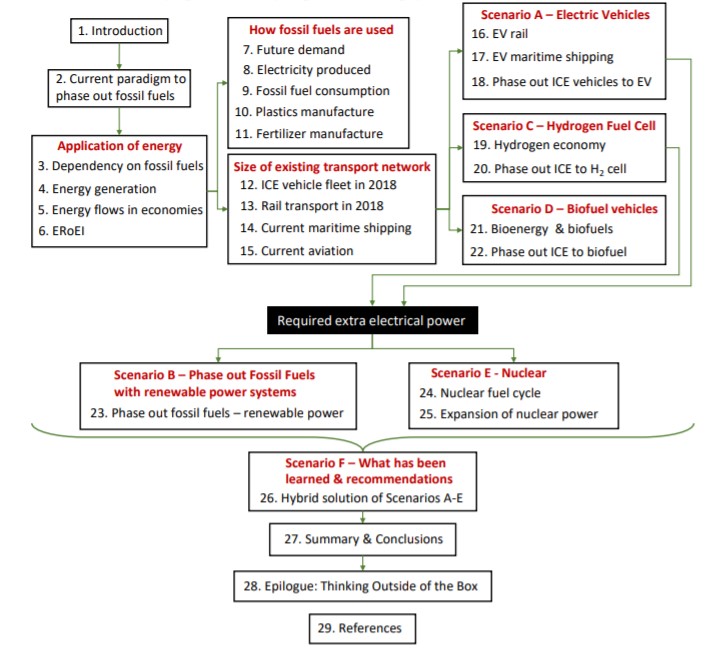A Bottom-up Insight Reveals: Replacing Fossil Fuels is Even More Enormous Task Than Thought
Replacing the existing fossil fuel powered system, using renewable energy technologies, for the entire human population is even more enormous task than thought, reveals the report made by Associate Research Professor Simon Michaux from Geological Survey of Finland GTK. Required extra energy and materials may form a bottleneck even if we could reduce consumption and material needs via circular economy and regulation.

“We are observing a large increase of investments that would be sufficient to transform our industrial ecosystem fossil free in 2-3 decades. Moreover, this transition should also cope with the future energy and material needs emerging from overall population growth”, says Simon Michaux.
The open file report addresses the challenges around the ambitious task of phasing out fossil fuels (oil, gas, & coal) that are currently used in vehicle Internal Combustion Engine technology (ICE) and for electrical power generation.
This report has produced new numbers that are quite different to previous studies. This could be due in part to the difference in paradigm that defined these studies. A novel bottom-up approach (as opposed to the typical top-down approach) was used to make the calculations presented here. Previous studies have also tended to focus on estimated costs of production and CO2 footprint metrics, whereas the present report is based on the physical material requirements. All data, figures and diagrams have been created or reproduced from publicly available sources and are cited appropriately.
Small-scale solutions won’t scale-up to meet the global need
Many of the solutions discussed in the open literature might work quite well at a comparatively small-scale but cannot function when scaled-up to a global scope to mimic the size of the existing fossil fuel sourced system. Usually, the bottleneck making this happen is the quantity of minerals required, the manufacturing capacity, or simply the required time to roll out production. Most analysts examine only one part of the ecosystem or only one function in isolation, where what is really required is a holistic systems network engineering approach, that honors the inherent complexity. That approach has been presented here.
Energy is the master resource
Key takeaways:
- Energy is the master resource
- The task to phase out fossil fuels is much larger than the current paradigm allows for
- Current planning for the phasing out of fossil fuels has significantly underestimated the size of the task
- Biofuel and Biomass are needed but cannot be scaled-up (Scenario D)
- Nuclear will be needed but cannot replace fossil fuel power generation (Scenario E) and
- Non-fossil fuel systems may not be effective enough to replace fossil fuel systems.
We are required to address these challenges in a 20 – 50-year time frame.
The role of minerals in the transition away from fossil fuels, is critically important, yet misunderstood
To address the multiple large-scale tasks currently facing humanity, a reliable energy source that is available to most of the human population with an ERoEI ratio of something like 50:1 is required, which is higher than both existing fossil fuel systems and much higher than renewable energy systems. Without this, plans for future development will have to let go of many current assumptions relating to maintaining existing consumption patterns.
The role of minerals in the transition away from fossil fuels, is critically important, yet misunderstood. Due the nature of the challenge, geoscientists are required to take part in planning for the future.

More Information
Simon Michaux, Associate Research Professor, Geological Survey of Finland
simon.michaux@gtk.fi, tel. +358295032159
Geological Survey of Finland: Solutions for more sustainable growth
The Geological Survey of Finland (GTK) produces impartial and objective research data and services in support of decision-making in industry, academia, and wider society. GTK employs more than 400 experts specialising in the mineral economy, circular economy, solutions related to energy, water and the environment, as well as digital solutions. GTK is a research institution governed by the Finnish Ministry of Employment and the Economy, operating in Finland and globally.

[…] Geologists have estimated that the available supply of many minerals required for wind turbines and solar panels is insufficient to build a replacement “renewable” energy infrastructure beyond one or two generations of these devices. […]
[…] Geologists have estimated that the available supply of many minerals required for wind turbines and solar panels is insufficient to build a replacement “renewable” energy infrastructure beyond one or two generations of these devices. […]
[…] batteries would consume nearly half the world’s proven nickel and lithium reserves, according to recent calculations from the Geological Survey of Finland. What’s more, those batteries would have to be replaced […]
[…] batteries would consume nearly half the world’s proven nickel and lithium reserves, according to recent calculations from the Geological Survey of Finland. What’s more, those batteries would have to be replaced […]
[…] batteries would consume nearly half the world’s proven nickel and lithium reserves, according to recent calculations from the Geological Survey of Finland. What’s more, those batteries would have to be replaced […]
[…] batteries would consume nearly half the world’s proven nickel and lithium reserves, according to recent calculations from the Geological Survey of Finland. What’s more, those batteries would have to be replaced […]
[…] would eat practically half the world’s confirmed nickel and lithium reserves, in line with recent calculations from the Geological Survey of Finland. What’s extra, these batteries must get replaced each few […]
[…] would devour practically half the world’s confirmed nickel and lithium reserves, in line with recent calculations from the Geological Survey of Finland. What’s extra, these batteries must get replaced each few […]
[…] In a recent report from the Geological Survey of Finland, researchers considered the minerals implications for achieving a so-called full transition; that is, using solar and wind to electrify all ground transport as well as to produce hydrogen for both aviation and chemical processes. They found the resulting demand for nearly every necessary mineral, including common ones such as copper, nickel, graphite, and lithium, would exceed not just existing and planned global production capabilities, but also known global reserves of those minerals. […]
[…] det finns mer än ett men och i en rapport skriven av Simon Michaux vid GTK (den statliga Geologiska forskningscentralen i Finland) har han uppskattat vad som skulle krävas […]